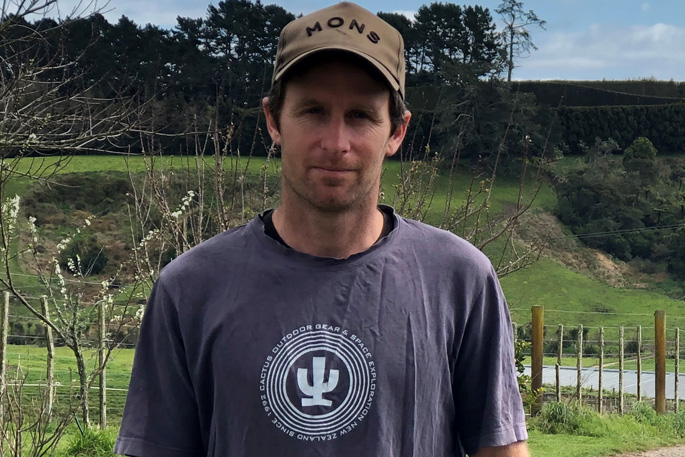Curiosity and a book recommendation has developed into a full-blown passion for organic farming for Opotiki dairy farmer Shane Armstrong.
Several years ago Shane, who milks 370 cows on his family’s 160ha effective farm, read an article about an organic farmer that included his top five book recommendations.
“I read the first book, ‘Folks, This Ain’t Normal’ by Joel Salatin, and I was hooked,” says Shane.
He subsequently devoured all literature on organics he could find – a practice that’s not slowed even today – and is now in the process of transitioning the farm to organic status, on track to qualify for full organic status in the 2020/2021 season.
Shane, alongside wife Alice, a GP, and children Evie, 4, and Cooper, 2, were variable order sharemilkers before purchasing all stock, machinery and dairy company shares from the Armstrong Farming Trust in the 2018/2019 season. They now lease the land and buildings from the trust.
Their move to a more biological way of farming started about five years ago when they overhauled their fertiliser practice.
“I was just not happy with the conventional treatment of land and animals,” says Shane.
“Previously we just did what our fertiliser rep told us to do. Despite never having used an excessive amount of urea, we used plenty of super phosphate and potassium.”
Balancing the biology
Shane employed soil consultant Michael Cashmore of Integrity Soils to help him balance the biology on the farm and create some diversity within the farm system, with fantastic results.
“In past years we have spent around $60,000 on fertiliser alone; this season we’ve spent only a couple of grand,” says Shane.
Encouraged by the improvement in the soil biology, Shane started looking more into organic principles, and found they resonated with his family’s philosophies around farming.
“We decided that organics ticked a lot of boxes for the farm and the family, and we started the conversion to organics last October.
“The benefits of going organic is threefold: a lower cost structure, a premium price for the milk, and a healthier product for people to eat.”
Next on the agenda is a focus on animal health. “At this stage the herd is still conventional, and not expected to start conversion until May 2020,” says Shane.
“However, the only animal health problem this season has been mastitis, and most of those cases have been self-curing.
“We are hoping it is due to the herd’s increased immunity from a healthier soil and therefore, healthier pasture.”
Their transition to organic is only part of a larger, comprehensive overhaul of land, pasture, and animal management on-farm.
The farm has adopted a once-a-day milking regime, now in its second season.
“The reason behind the change was to look after cow health – reducing foot problems and increasing in-calf rates – whilst reducing stress on staff and improving our own family lifestyle as well,” says Shane. “It’s going well.”
Diversification
Diversification has also played a huge part in the new direction the farm business has taken.
“We’ve planted thousands of trees so far, and have thousands to go,” says Shane.
“We also planted 3ha of avocado trees in October. We’re going grow the avocados organically with no chemical inputs, and no focus on profits; we’ll just call it a holiday fund.”
Shane says getting nature to work for them has been one of the most rewarding, and challenging, parts of transitioning to organics.
He believes one of the biggest hurdles they have faced has been veering away from conventional grazing of 3000kgDM/ha pre-graze to 1500kgDM/ha residual.
“We are experimenting with longer pre-grazes and leaving half of the plant behind once the cows have grazed it,” says Shane.
“Plant roots mimic what is happening to the top of the plant, so an over-grazed plant will have shrivelled roots; however, if only half the plant is grazed it can photosynthesise straight away and it doesn’t affect the roots.
“With high soil temperatures in summer, more plant residual will keep the ground shaded and hopefully will rectify any persistence issues.”
While far from being the status quo, Shane says there are a number of farming families nearby who are also biologically-minded, making for some educational and uplifting local discussion groups.
“People are starting to think about different pastures, lower stocking rates, and looking after the land better,” says Shane.
Read and watch
This includes his extended family: his sister Tina farms at Whakatane and his brother Shanon farms at Matata, both of whom are also in the process of converting to organics.
Shane believes anyone interested in organic farming should read and watch as much on the subject as possible. “The only downside to having so much information at your fingertips is that I’m always learning, and I keep changing my mind on things!”
Shane expects that almost a decade will have passed before they get the farm to the level they are aiming for. “It takes time to change your entire system,” says Shane.
“We want to see what nature can do for us, not a sales rep. We need to get chemicals out of our environment.
“Whether organics will have any effect on milk production – who knows?
“It’s really exciting to see how this is going to unfold for us.”



0 Comments
Leave a Comment